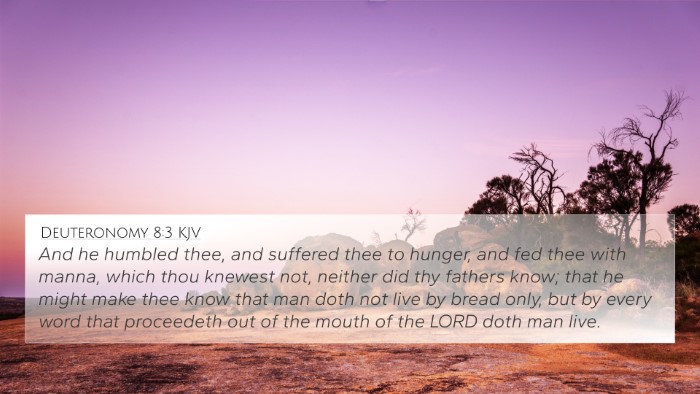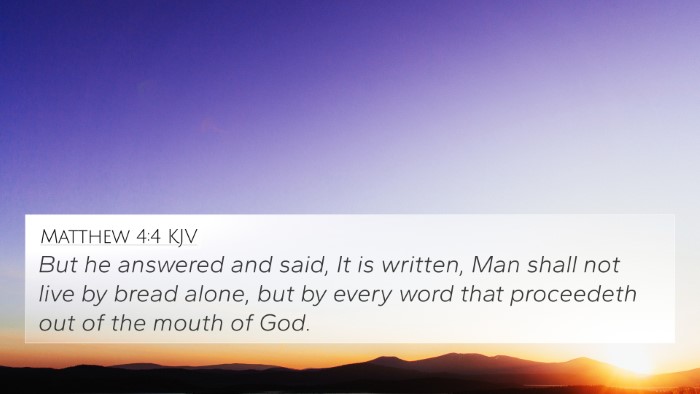Understanding Isaiah 38:16
Isaiah 38:16 states, "O Lord, by these things men live, and in all these things is the life of my spirit; so wilt thou recover me, and make me to live." This verse reflects a profound recognition of God’s sovereignty and His role in sustaining life, both physically and spiritually. Below is an analysis of this verse combining insights from prominent public domain commentaries.
Verse Context
In the context of Isaiah 38, King Hezekiah is nearing death due to illness, and he prays earnestly to God for healing. The verse reveals Hezekiah’s understanding that life and revival come from God alone. It exemplifies a deep theological insight that links physical existence with spiritual sustenance.
Thematic Insights
Many commentaries provide key themes related to this verse:
- Divine Providence: Matthew Henry emphasizes that life is sustained by God's will, affirming that God is the ultimate source of life.
- Spiritual Revival: Albert Barnes notes that the life of the spirit relies upon God’s intervention, highlighting the importance of divine recovery.
- Intercessory Prayer: Adam Clarke reflects on Hezekiah's passionate prayer as a means through which God initiates healing, portraying faith as a catalyst for God's action.
- Mercy and Restoration: Hezekiah’s plea for recovery illustrates an understanding of God’s mercy, which is a recurring theme in biblical narratives.
- Life Beyond Physical Existence: The acknowledgment of both physical life and spiritual vitality points to a holistic understanding of human existence as affirmed in the scriptures.
Bible Verse Cross-References
This verse connects with multiple other Bible verses, enriching its interpreted meaning:
- John 6:63: "It is the spirit that quickeneth; the flesh profiteth nothing..." - This verse parallels the concept of spiritual life given by God.
- Romans 8:11: "But if the Spirit of Him that raised up Jesus from the dead dwell in you..." - This connects to life being sustained through the Spirit.
- 2 Corinthians 1:9: "But we had the sentence of death in ourselves, that we should not trust in ourselves, but in God which raiseth the dead." - Reflecting trust in God’s power to restore life.
- Psalms 30:2: "O Lord my God, I cried unto thee, and thou hast healed me." - A clear connection highlighting God’s role in healing.
- Isaiah 53:5: "But he was wounded for our transgressions, he was bruised for our iniquities..." - Points to the broader theme of health and restoration through divine intervention.
- Philippians 1:21: "For to me to live is Christ, and to die is gain." - Emphasizing life’s duality encompassing both physical and spiritual realms.
- James 5:15: "And the prayer of faith shall save the sick..." - Similarity in prayer as a vehicle for restoration of health.
Inter-Biblical Dialogue
The relationship between this verse and others provides rich insights into biblical teachings. This inter-biblical dialogue illuminates the consistent theme of reliance on God for both physical and spiritual sustenance.
- Connection to Old Testament Themes: The verses resonate with themes from both the Law and the Prophets emphasizing God’s mercy and the basis for life.
- Linking New Testament Teachings: The New Testament reinforces the theme of God as the giver of life and healing, as seen in Jesus’ ministry.
- The Significance of Prayer: Recurring instances where prayer leads to divine intervention highlight the importance of believers’ communication with God.
Comparative Bible Verse Analysis
This analysis shows how Isaiah 38:16 fits into broader scripture themes:
- Emphasis on Divine Authority: Many scriptures reiterate God's power over life and death (e.g., Deuteronomy 32:39).
- Human Dependency on God: Scriptures such as Psalm 104:27-30 highlight creation's dependence on God for sustenance.
- Faith and Healing: The correlation of faith and God’s salvific work is seen abundantly in both the Old and New Testaments.
Tools for Bible Cross-Referencing
To further explore and analyze connections between scripture, the following tools and methods can be utilized:
- Bible Concordance: A comprehensive resource to identify specific words and themes across the Bible.
- Bible Cross-Reference Guide: Essential for finding parallel verses related to themes of healing and divine providence.
- Cross-Reference Bible Study Techniques: Methods such as thematic mapping can aid in deeper exploration.
Conclusion
Isaiah 38:16 serves as a poignant reminder of the integral connection between God’s mercy, healing, and the life of human spirit. Through careful analysis and cross-referencing with related biblical texts, one can fully grasp the profound spiritual truths embedded within this verse. This exploration not only enhances scriptural understanding but also encourages a deeper faith in God as the sustainer of life.











